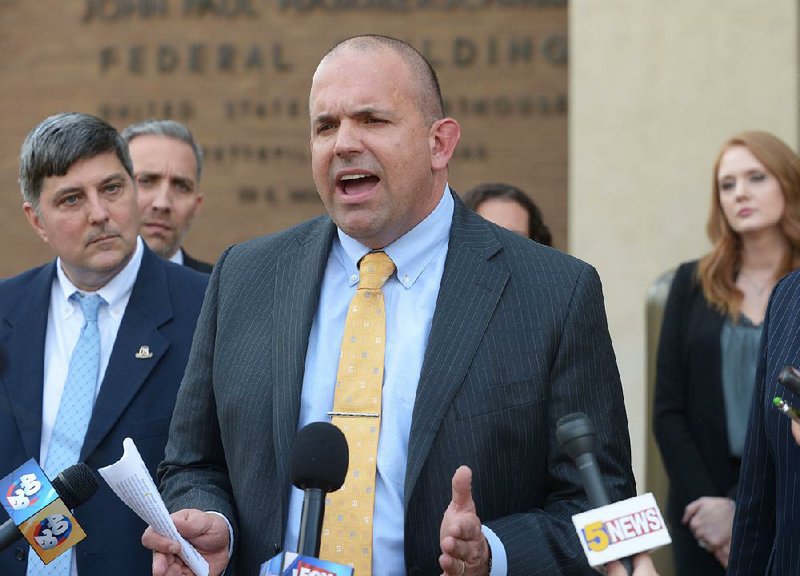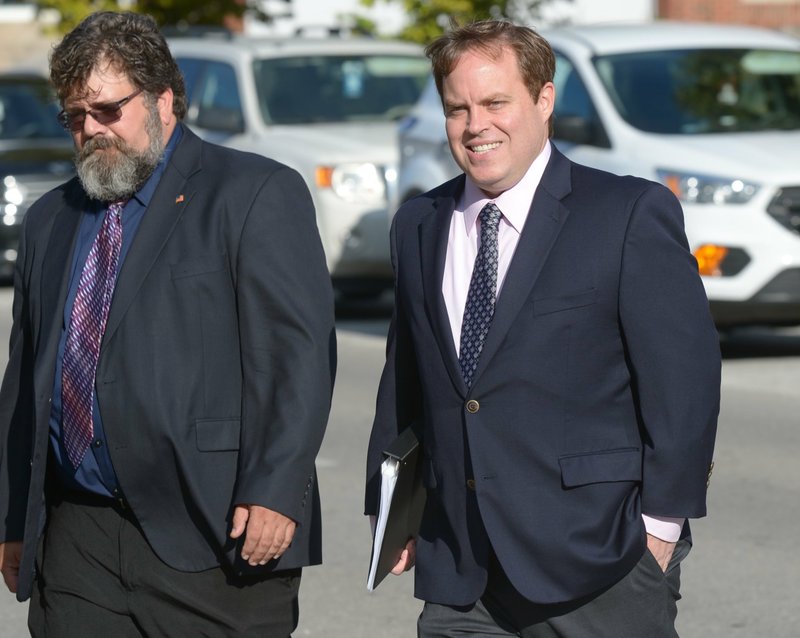FAYETTEVILLE -- Former state Sen. Jon Woods was sentenced to 18 years and four months in federal prison Wednesday for directing state grant money to companies in return for kickbacks.
U.S. District Judge Timothy Brooks also ordered Woods to spend three years on probation, pay $1.6 million in restitution and forfeit $1 million in assets to the federal government.
Woods of Springdale was convicted May 3 of 15 felony counts related to public corruption: one count of conspiracy to commit fraud, one of money laundering in the purchase of a cashier's check, and 13 of mail or wire fraud.
Woods is a first-time offender, but his crimes show a high level of sophistication and eagerness to profit off the public's trust, Brooks told Woods in explaining why he was rejecting his request for leniency.
When grant money was returned in one case, after investigators asked questions of the recipients, "your immediate, almost reflexive response" was to re-steal the same money by putting it in another grant to get another kickback, Brooks told Woods. "I find that amazing. I find that a great insight into the depravity of your heart.
"I think your mentality has evolved to the point that I think you have some serious criminal mentality issues" and would return to fraudulent behavior if given a light sentence, the judge told Woods.
Woods declined to either testify on his own behalf or make a statement during the sentencing. He sat without stirring throughout the judge's remarks on the factors in his sentencing, an explanation that lasted more than a half-hour.
The kickback schemes were sophisticated and took skill to execute, Brooks said.
"You were playing chess at a very high level, thinking three or four or five moves ahead. This wasn't a case of someone offering you a chance to make easy money and you taking it."
Federal sentencing guidelines allowed Brooks to impose a sentence of more than 33 years at the maximum, but that was excessive, the judge said. Woods remains free on bond until he's to report Sept. 26 to a yet-to-be-assigned federal prison.
Brooks said he was impressed by a dozen or more letters he received on Woods' behalf asking for mercy, and by the four witnesses who testified Wednesday for Woods, the judge said. Still, the good Woods had done in life and as a legislator didn't outweigh his actions, the judge ruled.
"Jon would always greet people and especially go to those who are not popular, who the rest of the world has discarded," the Rev. Keith Castleman of the Baldwin Church of Christ in Fayetteville testified. The fact that Woods sought out the "little guy" was a recurring theme in letters to the judge, Brooks said.

U.S. Attorney Duane "Dak" Kees argued that Woods was charismatic, and used his charm and purported concern for others to ultimately betray them.
"What we really have here is a man who took his charm and charisma, and asked the people for their trust and for power," Kees said. "They gave it to him. Then what did he do with it? He weaponized it."
Neither Woods nor his attorney, Patrick Benca, commented after the proceedings. Benca said during the sentencing that there would be an appeal to the 8th U.S. Circuit Court of Appeals.
Over defense attorneys' objection, Brooks said he considered as a factor in Woods' sentencing a $1 million state grant to a company run by a convicted lobbyist and obtained by a bribe -- even though Woods wasn't convicted in that scheme.
This was an unconstitutional use of a crime to enhance a sentence without confronting the accuser, Woods' defense argued.
Milton R. "Rusty" Cranford pleaded guilty earlier this year to obtaining the $1 million grant through a bribe in 2013 for Alternative Opportunities, a behavioral health company operating in Arkansas. Brooks overrode defense objections, saying the Alternative Opportunities grant was a relevant part of a wider scheme. The grant was made under Act 791 of 2013, which Woods sponsored.
Woods' sentencing was the first of four scheduled this week and next week in an ongoing federal and state investigation.
Randell Shelton Jr., who was convicted on 12 charges of conspiracy and fraud in the same trial, is to be sentenced today.
Woods' corruption case was the first in a string of indictments involving abuse of grants from the state's General Improvement Fund. Further investigations resulted in other charges for other former lawmakers involving bribery and Medicaid fraud.
Five former lawmakers stand convicted in the investigations. Jeremy Hutchinson, who was chairman of the Senate's Judiciary Committee, resigned Friday after he was charged by federal authorities with diverting campaign money to his personal use.
Woods was convicted in kickback schemes involving Ecclesia College in Springdale and AmeriWorks, a Bentonville nonprofit company. He received kickbacks on $350,000 in Improvement Fund grants that he directed to Ecclesia College and $275,000 in grants he sent to AmeriWorks.
Prosecutors didn't specify how much money Woods received in kickbacks because all but a $40,000 wire transfer was paid in cash, they said.
A state audit report dated July 15, 2015, found that Ecclesia College received $592,500 in General Improvement Fund money from the Northwest Arkansas Economic Development District between 2005 and 2014. The district distributes Improvement Fund grants largely at the direction of state legislators who provide the money, according to court testimony.
That method was found unconstitutional by the state Supreme Court last year.
Woods and former state Rep. Micah Neal of Springdale were responsible for $550,000 of those grants to the college. Later, grants from other districts were shown to raise the total to $715,500.
Neal pleaded guilty Jan. 4, 2017, for his role in the scheme and testified against Woods. Neal is set for sentencing next week along with Oren Paris III, former president of Ecclesia College, who pleaded guilty in April.
AmeriWorks, a nonprofit company incorporated by Cranford, received $400,000 from the Northwest District in 2013, all at Woods' and Neal's request. Cranford returned the money in September 2014 after federal investigators questioned him about the grant, according to court documents.
Cranford pleaded guilty in federal court in Missouri earlier this year in a related corruption case. He awaits sentencing.
Ecclesia College and AmeriWorks each received more from the Harrison-based district than any other public entity or nonprofit group except for a district-wide program to insulate the homes of impoverished Arkansans, audit results show.
Woods grew up in Springdale and graduated from the University of Arkansas, Fayetteville with a degree in marketing in 2002. He was working as a loan officer at a bank when he was elected to the state House in 2006. At the time, he was also a member of the rock band A Good Fight.
He served three terms in the state House before defeating incumbent Sen. Bill Pritchard, R-Elkins, in 2012. He didn't run for re-election in 2016, but collected the largest amount of per diem, mileage and other expense payments among senators that year at $33,692.
Metro on 09/06/2018
